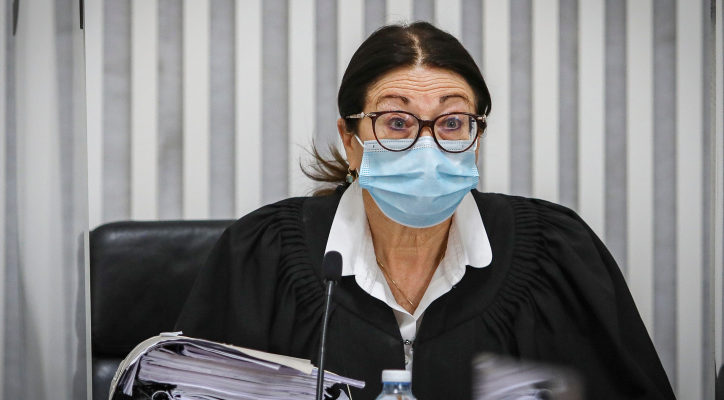Israel’s high court launches second day of hearings to hear arguments for and against the proposed national unity government.
By Paul Shindman, World Israel News
The Supreme Court opened a second day of hearings Monday to deliberate on arguments for and against changes to Israeli laws that the proposed new unity government says are necessary for it to take office.
Eleven Supreme Court justices will focus on the validity of the proposed legislation for the unity deal that will see a rotational leadership by Prime Minister Benjamin Netanyahu and opposition Blue and White leader Benny Gantz. Each will serve for 18 months as prime minister.
The court’s decision is due to be handed down on Thursday.
Netanyahu and Gantz signed the agreement last month after it appeared that Israel was headed to an unprecedented fourth national election following three consecutive ones that left no clear winner. Opponents say an indicted politician like Netanyahu should be barred from forming a new government and parts of the coalition deal are illegal.
On Sunday, the court heard petitions against Netanyahu serving as prime minister while he is under indictment on criminal charges of bribery, fraud, and breach of trust. After seven hours of hearings, the judges gave the impression they were not convinced by those who wanted Netanyahu out.
In the deliberations Sunday as to the legality of Netanyahu serving while under indictment for corruption, Chief Justice Esther Hayut told the court “the citadel will not fall” if it rules that Netanyahu can legally serve as prime minister.
Under Israeli law, a prime minister may remain in the job even with criminal proceedings against him until a final verdict is reached and all appeals are exhausted.
Attorney General Avichai Mendelblit told the court last week that Netanyahu’s indictments “raise significant problems” but he had no legal objection to Netanyahu serving as prime minister.
At the opening of Monday’s session, Hayut said the judges will consider the legal issues of the proposed changes to Israel’s existing laws needed to implement the terms of the unity deal. The changes include shortening the Knesset’s term of office to three years and allowing a two-year budget to be passed.
One of the controversial changes is to the so-called expanded “Norwegian Law,” legislation that allows a member of the legislature who is appointed to the cabinet to resign temporarily from the Knesset, allowing other members of their party who weren’t elected to take their place in parliament.
The unity deal calls for at least 36 cabinet ministers and up to 14 deputy ministers, while the current government has only 21 ministers and seven deputies.
“In the corrupt agreement that is currently being debated in the High Court, there are twice as many ministers and deputy ministers than the 23 confirmed corona infections in the past 24 hours,” tweeted opposition Yesh Atid member Orna Barbivay.
Opposition legislators have blasted the deal as a waste of public money when the country’s economy is being crippled by the pandemic and more than one in four Israelis are unemployed.
Israel has no constitution but it does have Basic Laws, which are considered to have greater force than regular laws and are viewed as quasi-constitutional. Opposition Israel Beiteinu party leader Avigdor Liberman slammed the unity agreement that would see the Basic Laws changed.
“These days, when the political system enslaves the Basic Laws in favor of coalition agreements … it is bad,” Liberman tweeted. “The solution to this evil sickness is a constitution for Israel and a constitutional court.”
The Knesset has until Thursday to vote in a new government before the mandate given to it by President Reuven Rivlin expires.





